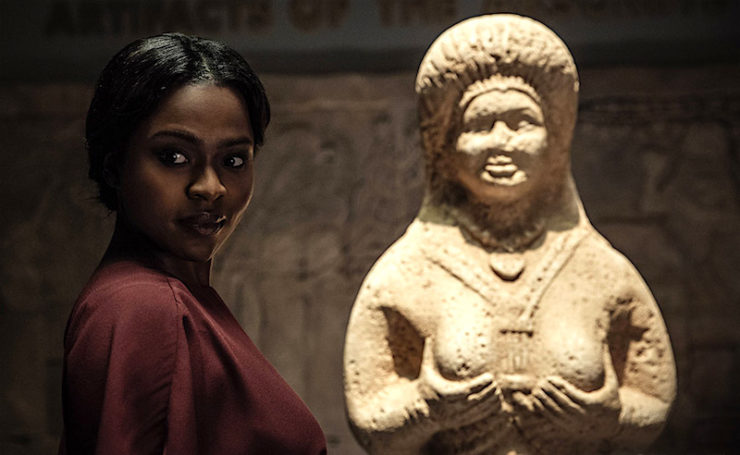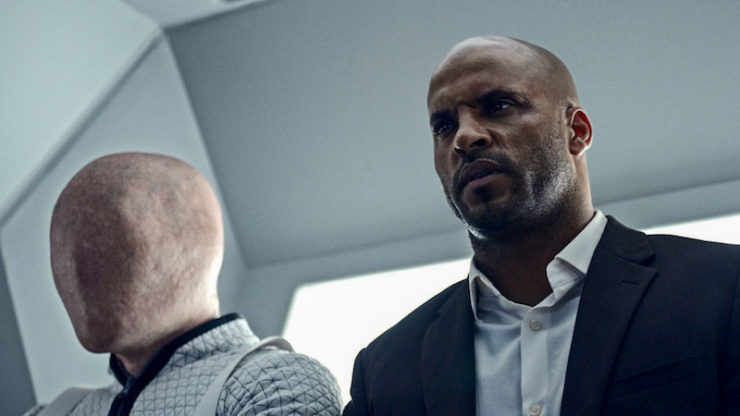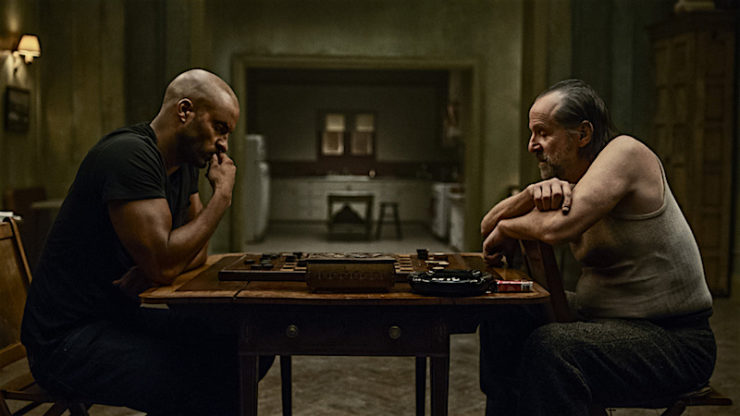At least, American Gods is now my favorite show. Like a lot of Gaiman fans, I read American Gods back in 2001 and loved it. I was already studying American religion, and I thought Gaiman’s book was the best representation of American faith, culture, and diversity I’d ever read. I’ve seen the first four episodes of Bryan Fuller and Michael Green’s adaptation—premiering on Starz this Sunday—and if anything it’s even more representative of the country we’re living in right now. I’ll talk about a few of the highlights below, but I’ll avoid plot points and anything remotely spoilery, because ruining anything for those of you who haven’t watched it would be, well, a sin.
Not only is Starz’s take on American Gods a great adaptation of Neil Gaiman’s novel, it’s also a great Bryan Fuller show. (I’ll admit that I’m not familiar with Michael Green’s work—an oversight that I intend to correct as soon as I have time to binge-watch Kings.) It’s also a wonderful, rich, multi-faceted look at life in this country that I think people who have no particular interest in Gaiman, Fuller, or even fantasy as a genre will also love if they give it a chance.
For those who don’t know the book, the plot involves an ex-con named Shadow Moon, his relationship with his wife, Laura, and a war between the Old Gods (think Odin, Bast, Czernobog, Anansi, etc.) who are losing followers to the New Gods (Media, Technology, Corporations, etc.). As the Old Gods lose followers, they also lose their essence—to be forgotten by humanity spells death for them. When we join the saga, the OG have already been battling comparatively newer faiths like Christianity and Hinduism, and have had to find ways to get by in America without the benefit of regular sacrifices and worship. Now they also have to contend with sleek upstarts like The Technical Boy and Mr. World. As in Gaiman’s novel, Fuller and Green introduce us to this world through Shadow Moon’s eyes as he meets a man named Mr. Wednesday and (reluctantly) agrees to become his assistant/driver/bodyguard. But what starts out as a basic “guy returning to life after prison” story just gets weirder and weirder. It also features plenty of oversaturated blood splashing around like a love letter to all those bereft Hannibal fans out there, plus gods and demi-gods snarking on current culture for all the squee-ing Gaiman fans. And woven in between the fan service is a powerful meditation on faith, race, sexuality, and what makes a human a human.

The show mirrors the book’s picaresque road-trip structure by hopping around between the main plot and shorter vignettes about various gods and humans. The writers aren’t afraid to let scenes that could be smaller (Shadow packing for a trip, Laura spending time with her cat, Bilquis visiting a museum, sex of any kind) linger on screen for a while, because they’re trusting their audience to settle in and get to know the characters in between the flashier scenes. In the fourth episode, the show goes largely off-book to explore a character who didn’t get enough attention in the original novel. I know some people are saying that this is the episode that sold them on the show, but personally I was hooked from scene one.
Let start with the fun stuff: the sex is unlike anything I’ve ever seen on television in this country. Where Game of Thrones pioneered a technique called “sexposition”, with characters discussing plot points while bodies writhed around them, American Gods‘ sex scenes reveal intimate character details through the action. The writers have also given each of the scenes a point of view—these scenes aren’t just a series of gratuitous writhing naked people. Most important of all, the sex in the show is often used as a form of worship, which serves to make the scenes central to the show’s concern with the nature of faith. Fans of the book will recall a particular scene that occurs early on with a character named Bilquis, but honestly, that’s one of the tamer ones. The third episode devotes a serious amount of screen time to one of the most gorgeous, erotic, moving sex scenes I’ve ever watched. The fact that its graphic is beside the point—this is a show positing that humans are, essentially, what they believe, and that sex can be a form of worship just like anything else.
There are only a few sex scenes between humans, but even these work on several different levels at once. The first love scene between Laura and Shadow not only gives you a glimpse into their minds, but also lays the foundation of their relationship. I would argue that the showrunners are also using this brief scene to comment on four hundred years of racial violence in America, in one of the richest, most emotionally-charged moments we’ll see on TV this year.

I know a lot of book-readers didn’t realize that Shadow was biracial until late in the novel, if then. The show not only makes that a central, constant issue, it also uses imagery of nooses, lynching, and faceless, Clockwork Orange-style thugs to comment constantly on the danger Shadow faces simply by being a black man in America. The show doesn’t spend a lot of time in prison, but it doesn’t need to belabor the point—that the system destroys everything it touches, and that the system seems to have a knack for targeting and destroy people of color particularly. Shadow’s time in prison is marked by encounters with racism, but we see that once he’s out, he’s still running into people (and gods, for that matter) who would dehumanize him because of his race. Add these seemingly small instances to the role that Orlando Jones’ Mr. Nancy plays, and you get a show that is grabbing America’s racial history by the throat and shaking it.
Despite some initial pushback, Fuller and Green chose to incorporate Gaiman’s “Coming to America” and “Somewhere in America” segments into the show. This may lead to a fragmented viewing experience for people who are coming to the show without knowledge of the book, but I hope everyone will stick with it and allow the tapestry to weave. I think those who know the book will be thrilled at how the stories have been edited into the main plot. They also add to one of the big thematic concerns of the show—this is an immigrant story, and appropriately we get scenes of Muslims from Egypt and Oman, Scandinavians, Russians, Africans, a Leprechaun, sarcastic elderly women, brash young men, happily married couples, unhappily married couples, shotgun-toting bartenders, cabbies, homemakers; in the first four hours of this show we get more real diversity than most television ever gives us. We also get a deep consideration of the ways race and class define life in this country. The writers are inviting everyone to the conversation, while laying out the fact that some people in America have far more rights than others. They give us characters who say racist things while being fundamentally decent people, but they also give us people who seem nice and open-minded but do horrific things to their fellow man. (I remind you, this complexity is all contained in the first four episodes. Have I mentioned that this is my new favorite show?)

American Gods is, at its heart, a story about the immigrant experience. You would think that this would be a perfectly nice, interesting topic to write about, but Neil Gaiman has talked about being hit with boycott threats. Personally, despite its origin in a British writer’s novel, I think American Gods is the most truly “American” show I’ve ever seen. The show is pro-immigrant. The show goes to great lengths to impress upon its viewers that immigration is not a terrifying thing, but rather a necessary infusion of life and culture. The show also makes sure to point out that not all immigrants came here by choice.
The casting is perfect. On paper, of course, the cast looked extraordinary, but each actor goes so much further than I even dared to hope. Ricky Whittle imbues Shadow with both a deadpan humor and a sense of pathos that he never quite had in the books. Emily Browning is perfect as Laura, and creates what may be the most complicated and true portrait of a woman I’ve ever seen on television. Bruce Langley is terrifying as Technical Boy, channeling Mark Zuckerberg and Nathan Barley into a brief scene that introduces the show’s larger plot. The showrunners have talked about how they updated the basement-dwelling nerd stereotype of the book, but his performance is so vicious you can believe him as a leader the New Gods, and his youth and bluntness makes him a perfect foil for the older, charm-slinging Mr. Wednesday.

Did I also mention that Ian McShane is perfect as Mr. Wednesday? He might actually be Mr. Wednesday. Yetide Badaki and Pablo Schreiber are glorious embodiments of Bilquis and Mad Sweeney, and will apparently both have more complex roles to play than they do in the book. I had to watch Gillian Anderson’s first scene as Media twice because I screamed through it the first time, and missed all of her dialogue. And finally, Orlando Jones gives a blistering performance as Mr. Nancy. I honestly don’t know what to say about him—not just because I don’t want to spoil anything, but even more that nothing I say will due the performance justice. If he doesn’t get to do an Anansi Boys show we should burn the world down.
OK, so maybe you’ve noticed that I have not even touched on Bryan Fuller’s involvement yet, but we’ve hit peak Fuller here, too. His commitment to producing sex-positive, pro-female, queer-friendly work is on display, but it doesn’t even matter. He’s not ticking off boxes or meeting quotas, he and Michael Green are taking Neil Gaiman’s tapestry and expanding it to show us the country and time we’re currently living in. I am so excited to be on the road with them, and see what pockets of America they want to visit next.
Leah Schnelbach didn’t even get to talk about how perfect the music was, or about the fantastic representations of death, or the role of cats! Come, tell her about your favorite divinities on Twitter.









